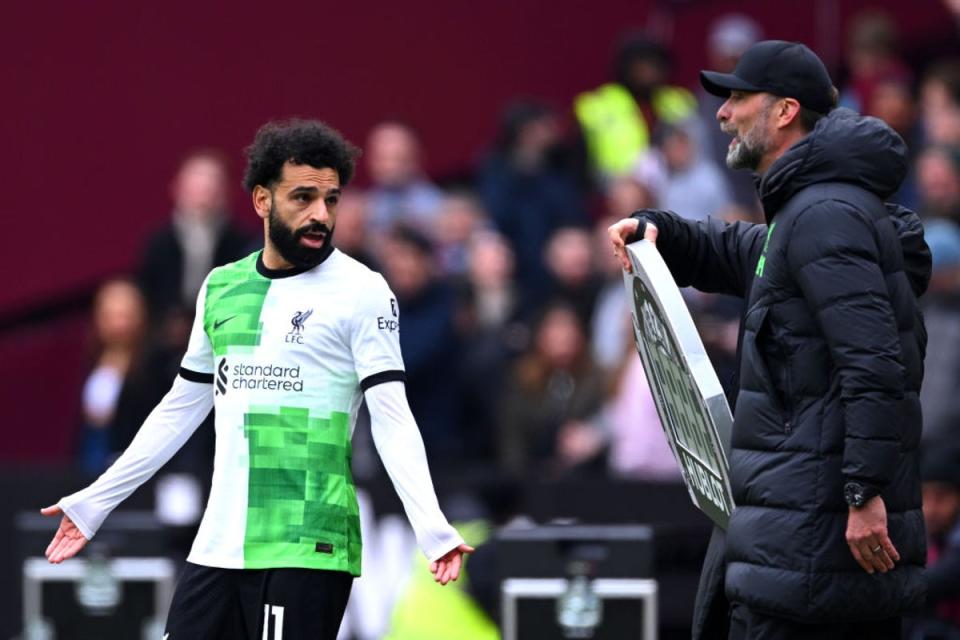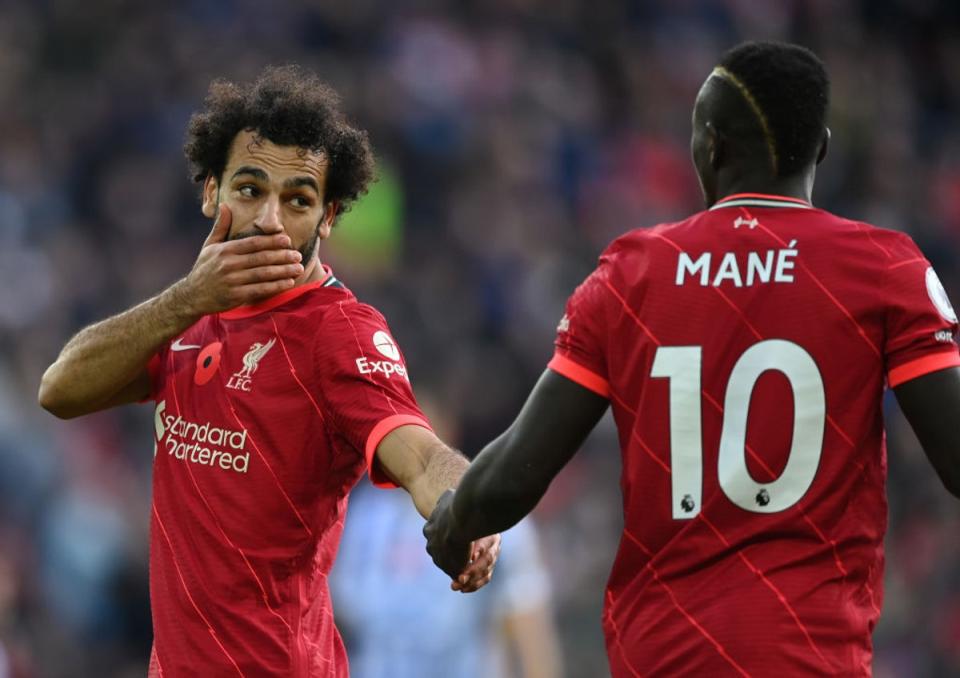Mohamed Salah’s latest touchline tantrum symbolises deeper Liverpool split

In a sense, Mohamed Salah’s season has come full circle. It started with a display of dissent amid a substitution in London, the Egyptian contriving to rip a rather small bandage into an absurdly high number of pieces when taken off at Chelsea. Some eight months later, Salah was irritated when being brought on at West Ham. Now some of the context has changed: his latest touchline tantrum in the capital came after a player who was long an untouchable had been benched following perhaps the poorest run of form of a great Liverpool career and by a manager who is departing.
If Salah’s alliance with Jurgen Klopp, an enduring relationship that has benefited both hugely, may be ending with a hint of acrimony, that could be a shame; certainly it seemed a symbolic moment of how Liverpool’s season is suddenly falling apart. Equally, his August irritation at Chelsea changed little. Salah’s displays in the first half of the campaign were sufficiently scintillating that he looked a player-of-the-season contender.
Has the latest incident actually altered anything? The backdrop is still the same: that Salah, like Virgil van Dijk and Trent Alexander-Arnold, has a year left on his contract and that his future will be figure high on the to-do list of the incoming powerbrokers, Michael Edwards and Richard Hughes. His recent performances invite the question if this is just a rare dip or a sign that, after 696 games before his 32nd birthday, he is over the hill and accelerating down the other side.

The Saudi Pro-League presents a spectre: if Liverpool’s Moneyballers get a repeat of last summer’s £150m offer or anything close to it, there would be financial grounds to accept. Yet if there was an oddity that Al Ittihad left it so late to bid for Salah then – given his status in the Arab world as well as his footballing exploits, it might have been more logical if he had been one of the first targets – he did not agitate for a move then.
Now the expectation at Anfield remains that Salah will be there next season; it was the assumption last week and a brief dispute that was caught on camera has not changed that. Salah’s subsequent words were incendiary. “If I speak there will be fire,” said a man who has spent seven years at Anfield speaking as little as possible. Yet even if there is a fissure between Salah and Klopp, the more instructive issue is how or if he gets on with Arne Slot and what the incoming manager thinks.
There was, though, a jolt in seeing Klopp and Salah bickering, and not merely because Darwin Nunez looked to be trying to separate them. Klopp’s rows on the touchline tend to be reserved for the fourth officials who, it is safe to say, will not miss him. His man-management of Salah has been deft. He has long excelled at brushing aside the social-media outbursts of his agent, Ramy Abbas. He said he understood the Egyptian’s reaction at Chelsea.
Klopp has usually been reluctant to take Salah off, seemingly rationalising the forward’s hunger for goals was more important than the possible fatigue of an added workload. There can be a selfishness to Salah, but perhaps a single-minded approach was needed to propel him to such improbable highs.
It did not always endear him to colleagues. Salah’s relations with Sadio Mane were not invariably harmonious, as a 2019 altercation at Burnley showed, but Klopp could usually find ways of explaining everything in public. Roberto Firmino, who later said it was easier for Klopp to substitute him than his fellow forwards, recalled the manager addressing his players and telling him to pass if a teammate was in a better position. It was aimed at Salah.

But if his primacy meant he was afforded preferential treatment, there has been a shift in recent weeks. Salah was taken off after an hour against Sheffield United and 67 minutes away at Atalanta, both when Liverpool required a goal. On the basis of each game, it was a justified decision. A tally of 210 goals in seven years, however, meant Salah has stayed on in similar situations in the past.
But his 2024 has been troubled. As Klopp noted, Salah was not used to being injured. Perhaps he erred in bringing him back as a first-half substitute at Brentford in February, leading to the winger breaking down again. Maybe he made a mistake by replacing others and, after Bobby Clark’s injury meant he had to be the fifth man to go off, leaving Salah on for all of a 6-1 rout of Sparta Prague. The German said afterwards it was the only time he told a player not to defend, but it still meant Salah had to be removed at Old Trafford three days later, in the FA Cup tie where the quadruple dream died.
At the last, Klopp and Salah have suddenly stopped being good for each other. A manager who projected an air of calm amid the Saudi interest last summer looked angrier at West Ham. A forward who is accustomed to scoring at will could be raging at the dying of the light, if this is the start of decline, or merely frustrated that his powers have temporarily deserted him.
Until now, Klopp and Salah have always had added reasons to keep any frustrations hidden. Now arguably Liverpool’s player of the Klopp years will part company with the manager. Such scenarios can be explosive: Sir Alex Ferguson finished his time at Manchester United by omitting Wayne Rooney from the bench, let alone the team. It is hard to imagine Klopp following suit with Salah. But whereas there has been a picture of unity for years, now there are cracks in the image.

